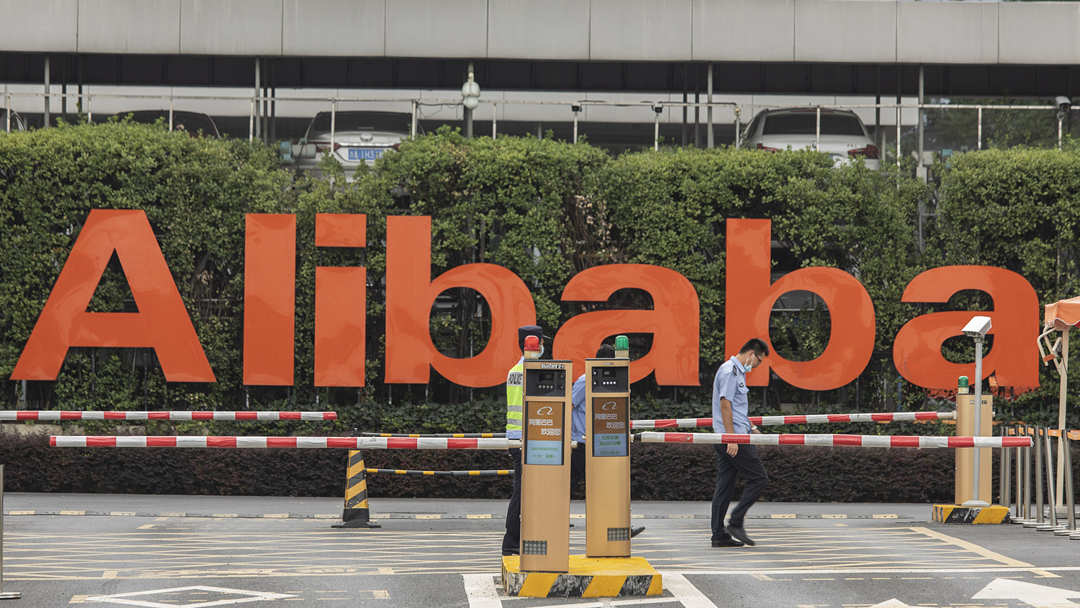
Outside view of Alibaba Group's headquarters in Hangzhou, east China's Zhejiang Province. /CFP
Outside view of Alibaba Group's headquarters in Hangzhou, east China's Zhejiang Province. /CFP
China's e-commerce giant Alibaba Group will invest 100 billion yuan ($15.5 billion) by 2025 to support the country's drive for "common prosperity," the company said Thursday, becoming the latest firm to commit to the national goal of reducing wealth inequality.
Alibaba confirmed that the funds will be used to promote investments in technology, support small and medium-sized enterprises, foster development in rural areas and improve insurance protection for gig economy workers, including deliverymen and ride-hailing drivers.
It will set up a permanent unit to launch the program and establish a 20-billion yuan fund earmarked for common prosperity development.
Alibaba has been under regulatory scrutiny for issues ranging from monopolistic behavior to consumer right infringements. In April, it was fined a record 18.2 billion yuan – 4 percent of its 2019 domestic sales – for violating the country's Anti-Monopoly Law.
Read more:
Alibaba Group fined $2.78 billion for abusing dominant market position
The company's net profit for the quarter ended June 30 dropped 8 percent from a year ago to 43.44 billion yuan. It posted revenues of 205.7 billion yuan that quarter, versus 153.7 billion yuan in the same quarter last year.
Read more:
Alibaba reports 34% quarterly revenue growth and $15 billion share repurchase

A Meituan food deliveryman on the street in Shenyang, northeast China's Liaoning Province, May 18, 2021. /CFP
A Meituan food deliveryman on the street in Shenyang, northeast China's Liaoning Province, May 18, 2021. /CFP
Alibaba's move follows other Chinese firms including food delivery giant Meituan, fast-growing e-commerce giant Pinduoduo and tech giant Tencent, which have made similar announcements to embrace the "common prosperity" drive.
On Monday's earnings call, Meituan's founder Wang Xing translated Meituan's name as "better together" in Chinese and said "common prosperity" was "built into the genes of Meituan."
On the same day, Meituan posted a third consecutive quarterly loss of 2.21 billion yuan in the April-June period. Hours before, China's market regulator announced that it had initiated an antitrust investigation into the company's acquisition of bike-sharing firm Mobike in April 2018.
Labor issues at food delivery platforms, including Alibaba's Ele.me and Meituan, have come under scrutiny in recent months, as they reportedly sent deliverymen on impossible routes in line with stringent algorithms when fulfilling orders, and penalized them for late deliveries.
Pinduoduo also announced an initiative of 10 billion yuan for farmers' welfare on its second-quarter earnings call.
Tencent said last month it would double the amount of money allocated for social responsibility programs to about $15 billion, which gave full play to the role of enterprises in the "third distribution."
The third distribution was a call under the government's drive for "common prosperity," and it refers to charity and donations.
Read more:
Analysis: Common prosperity and policy implications
The drive marks a turn from the early years of reform and opening-up policy when the government encouraged "some people, some regions to get rich first." It signals a more equal society with better social welfare as the country becomes richer and more advanced.
But the push won't rob the rich, Han Wenxiu, an official with the Central Committee for Financial and Economic Affairs, told a press conference last week.
Read more:
'Common prosperity' in China won't rob the rich: CPC official
The country will vigorously push for high-quality development, raise the income of both urban and rural residents, gradually narrow the gap in distribution and "resolutely prevent polarization," he said.
At least 73 companies have mentioned common prosperity in shareholders' statements filed to exchanges in Hong Kong, Shanghai and Shenzhen over the past two weeks, according to a Bloomberg report.
Read more:
Chinese firms embrace 'common prosperity' drive in earnings reports

